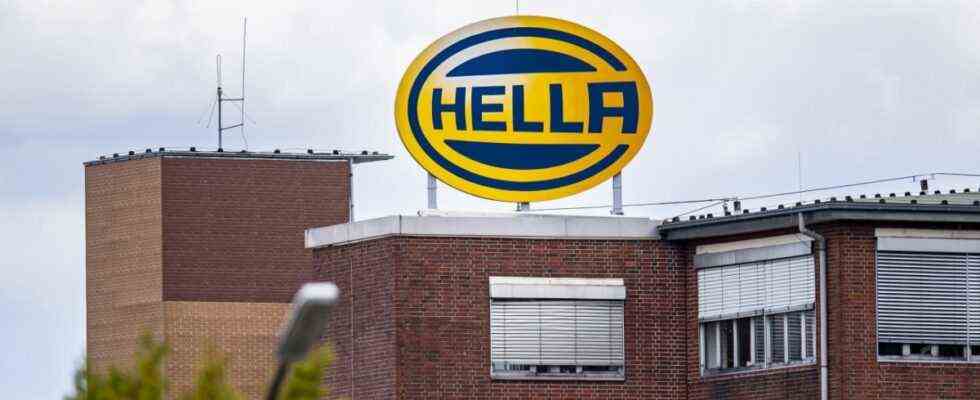It was just a few dry lines that the Munich brake manufacturer Knorr published on Tuesday afternoon. But they had it all. The company has a “fundamental interest” in buying around 60 percent of the shares in the automotive supplier Hella. The talks are “at a very early stage”, it is not yet clear whether a transaction will come about. The news nevertheless caused a stir: The Knorr-Bremse share price initially fell sharply, by more than twelve percent, the biggest slide since the IPO in 2018. Hella’s shares, in turn, gained more than nine percent. Some assume that the talks may have progressed further.
It doesn’t often happen that one M-Dax company shows interest in another. Should Knorr-Bremse and Hella join forces, it would also have an impact on the entire supplier industry in Germany. Because Knorr-Bremse and Hella would together – measured by sales – be one of the largest automotive suppliers in this country, bigger would then only be Bosch, Continental and ZF. And two companies would come together whose product ranges would hardly overlap, which could rather go together well. Because with Hella, Knorr-Bremse, which has so far mainly focused on braking systems, would get what has been missing so far, namely electronics expertise for the future of electricity. The Munich-based group is primarily active as a supplier to truck and train manufacturers, while Hella mainly equips passenger cars. Knorr-Bremse has almost 30,000 employees, Hella around 36,000.
The auto supplier industry has been under pressure for a long time because requirements are changing rapidly. The major car manufacturers are in a state of upheaval, they are switching from diesel and gasoline vehicles to electric drives and at the same time have to promote autonomous driving. That is why there is always speculation about takeover.
It is unclear how the billion dollar business could be financed
Knorr-Bremse is currently worth around 16 billion euros on the stock exchange, Hella 6.5 billion euros. For 60 percent of the Hella shares, which are currently still owned by the former founding families Hueck and Röpke, who have wanted to sell for some time, the Munich-based company would have to pay around four billion euros. In addition, there might be a settlement to the other shareholders. The advance was surprising, said one dealer: “The question of financing is still in the room.” In order to be able to afford the takeover, which amounts to well over six billion euros, Knorr-Bremse would need a capital increase. The price could also rise, because the Munich-based company is apparently not the only interested party: the French automotive suppliers Plastic Omnium and Faurecia as well as financial investors have also submitted bids for Hella, according to financial circles. The process will be controlled by the investment bank Rothschild, according to Reuters.
Knorr-Bremse has been listed on the stock exchange since October 2018, the Thiele family holds 59 percent of the shares, which were transferred to a family foundation after the death of Heinz Hermann Thiele in February of this year. Heinz Hermann Thiele took over the company in 1985, got it out of the crisis and turned it into a global group with an annual turnover of over six billion euros. As a result of the pandemic, the 2020 operating profit of 1.1 billion euros was around 17 percent lower than in the previous year. The equity amounts to almost two billion euros.
Heinz Hermann Thiele, who died in February, made Knorr-Bremse great over the past few decades.
(Photo: imago images / HRSchulz)
The pandemic hit Hella harder: The bottom line was that the company made a loss in the past fiscal year. Nonetheless, Hella is doing comparatively well when it comes to changes in the automotive industry. The company’s history began in 1908 with the first lighting system for the then still young automobile. To this day, Hella has primarily been supplying lighting and electronic systems for the exterior and interior of vehicles, including sensors and voltage converters. “We are assuming that by 2030 every second newly sold car will be electrified,” said managing director Rolf Breidenbach most recently. Suppliers are also increasingly becoming software developers: “All of these are developments that are very beneficial for our business model,” Breidenbach once said. Whether the car runs on petrol or on batteries: it will always need lights.
The former McKinsey consultant trimmed Hella for efficiency. The company has cut jobs several times, most recently in Regensburg or at its headquarters in Lippstadt, Westphalia, where Hella is one of the largest employers. In presentations, the engineer prefers the word “diagram” instead of “slide”, he sucks his chief financial officer in public – details that have become a certain rarity in the angled business world. Since the IPO in 2014, the share price has more than doubled.
Knorr-Bremse is also working on a change: The new CEO Jan Mrosik, who came from Siemens at the beginning of the year, wants to digitize the group. Hella’s business with sensors, which are a prerequisite for autonomous driving, could be of interest to Knorr-Bremse. Knorr-Bremse is currently getting this technology from Continental. In the past few months, Knorr boss Mrosik had repeatedly emphasized that Knorr-Bremse was always open to takeovers if it was right. And it would obviously fit with Hella.

